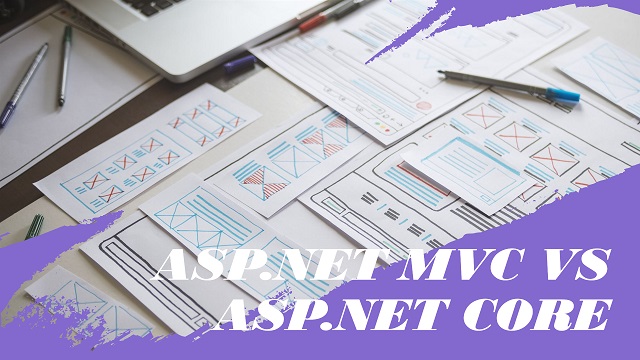Overview of ASP.NET MVC
ASP.NET MVC (Model-View-Controller) is a web application framework developed by Microsoft, released in 2009. It follows the MVC design pattern, which separates an application into three main components: Model, View, and Controller. This separation helps manage the complexity of large applications by promoting clean code architecture.
Key Features of ASP.NET MVC
- Separation of Concerns: The MVC pattern allows developers to separate the business logic, user interface, and input control.
- Testability: The framework supports unit testing, making it easier to test individual components.
- Extensibility: ASP.NET MVC is highly extensible and customizable, allowing developers to modify the framework to suit their needs.
- Integration with ASP.NET: ASP.NET MVC integrates seamlessly with existing ASP.NET features, such as membership providers, authentication, and authorization.
Overview of ASP.NET Core
ASP.NET Core is a cross-platform, high-performance framework for building modern, cloud-based, and internet-connected applications. Introduced in 2016, it is a significant redesign of the ASP.NET framework, focusing on performance, simplicity, and flexibility. ASP.NET Core is open-source and maintained by the .NET Foundation.
Key Features of ASP.NET Core
- Cross-Platform: ASP.NET Core runs on Windows, macOS, and Linux, making it a versatile choice for various development environments.
- High Performance: The framework is optimized for performance and scalability, with benchmarks showing it as one of the fastest web frameworks available.
- Unified Framework: ASP.NET Core unifies the previously separate ASP.NET MVC and Web API frameworks into a single programming model.
- Dependency Injection: Built-in support for dependency injection enhances modularity and testability.
- Modular Architecture: ASP.NET Core’s modular design allows developers to include only the necessary components, reducing the application’s footprint.
Comparing ASP.NET MVC and ASP.NET Core
Performance and Scalability
- ASP.NET MVC: While capable of handling substantial workloads, ASP.NET MVC does not match the performance optimizations of ASP.NET Core. Its monolithic nature can make scaling more complex.
- ASP.NET Core: Known for its high performance and scalability, ASP.NET Core is designed to handle modern web applications’ demanding requirements. Its lightweight and modular architecture contributes to its superior performance.
Cross-Platform Capabilities
- ASP.NET MVC: Limited to running on Windows environments, making it less flexible for developers working in different operating systems.
- ASP.NET Core: Offers true cross-platform capabilities, allowing applications to run on Windows, macOS, and Linux. This flexibility is a significant advantage for teams working in diverse environments.
Modern Features and Ecosystem
- ASP.NET MVC: Integrated closely with Visual Studio, which provides a rich development environment but can be restrictive in terms of IDE choices.
- ASP.NET Core: Supports multiple IDEs, including Visual Studio, Visual Studio Code, and JetBrains Rider. Its cross-platform nature also means more deployment options, including Docker containers and cloud services.
Compatibility and Migration
- ASP.NET MVC: Existing applications built on ASP.NET MVC may require significant effort to migrate to ASP.NET Core due to differences in architecture and APIs.
- ASP.NET Core: Offers compatibility with .NET Standard, making it easier to share code between different .NET applications. However, migration from ASP.NET MVC to ASP.NET Core can be complex and requires careful planning.
Choosing the Right Framework
When to Choose ASP.NET MVC
- Existing Projects: If you have a legacy application built on ASP.NET MVC, it may be more practical to continue development within this framework, especially if it meets your current needs.
- Specific ASP.NET Integrations: For projects that rely heavily on ASP.NET features and integrations, ASP.NET MVC can be a suitable choice.
- Team Familiarity: If your development team has extensive experience with ASP.NET MVC, leveraging their existing skills can lead to more efficient development.
When to Choose ASP.NET Core
- New Projects: For new applications, especially those requiring high performance, scalability, and modern features, ASP.NET Core is the recommended choice.
- Cross-Platform Requirements: If your application needs to run on multiple operating systems or integrate with different development tools, ASP.NET Core’s cross-platform capabilities are essential.
- Cloud and Containerization: For cloud-native applications and those leveraging Docker containers, ASP.NET Core provides superior support and flexibility.
- Future-Proofing: ASP.NET Core’s continuous updates and growing ecosystem make it a robust choice for long-term projects.
Both ASP.NET MVC and ASP.NET Core are powerful frameworks with their own strengths. The choice between them depends on your project’s specific requirements, existing infrastructure, and future goals. ASP.NET MVC remains a solid option for maintaining legacy applications and leveraging familiar features. In contrast, ASP.NET Core stands out for new projects needing high performance, scalability, cross-platform capabilities, and modern development practices.
By carefully considering these factors, you can choose the framework that best aligns with your project’s needs and ensures a successful and efficient development process.

